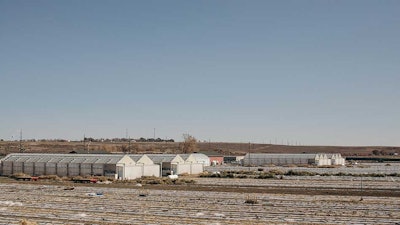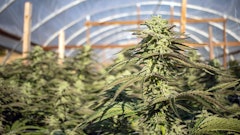
In May 2021, Boris Jordan, executive chairman of the board at Curaleaf, announced the multistate cannabis company’s plans to acquire Colorado's Los Sueños Farms, a $67 million deal for one of the largest legal outdoor cannabis cultivation sites in the U.S.
The site, with 36 acres of active production and 66 acres of capacity, would provide Curaleaf “with a high-quality, efficient and low-cost supply of biomass and support our wholesale and retail customers in Colorado and, once interstate commerce is allowed, on a regional scale,” Jordan had said in the announcement. In 2021, the state’s combined adult-use and medical sales grew to more than $2.2 billion, after surging by more than 25% in 2020, the year the COVID-19 pandemic hit.
Investing in Colorado, the second-largest cannabis market in the U.S. at the time and one of the oldest adult-use landscapes, might have seemed like a safe bet, both because of current conditions and future potential. Many believed soaring sales were a sign that cannabis was pandemic proof, and recession proof.
But a few months after the deal closed, wholesale prices started to decline. Inflation pressure swelled, and concerns of recession set in. In January 2021, on average, a pound of cannabis flower sold for $1,721, according to statistics from the Colorado Department of Revenue. That number fell to $948 by January 2022. This past January, the average pound went for about $650, though some say growers are selling for far less. In January, Curaleaf, which had operations in 21 states, announced it was exiting Colorado, closing cultivation and production facilities, in addition to the distressed markets of California and Oregon. One of those cultivation sites included Los Sueños Farms.
RELATED: Ag-Tech and Precision Farming Drive Innovation at Los Sueños Farms
“We have a fiduciary responsibility to our shareholders to improve margins and fortify our balance sheet by controlling what we can in our business, and the difficult operating environment in these states prevented us from generating an acceptable return on our investments,” Curaleaf CEO Matt Darin said in an email to Cannabis Business Times and in an official company announcement. "Although we are exiting our owned assets in these markets, we continue to explore various alternatives to retain our presence, including licensing our Select brand."
Multistate operator Columbia Care, with licenses in 18 U.S. markets, also announced in January that it had closed four unprofitable dispensaries, three in Colorado and one in California, and had consolidated cultivation operations in California, Colorado and Pennsylvania, in addition to the company's move to "decrease corporate headcount by 25%," according to the release.
In light of unprecedented inflation and persistent economic headwinds, the current dislocation in the capital markets, and the political and regulatory structures that allow the illicit market to proliferate in some jurisdictions, we have made the decision to restructure targeted areas of our business," CEO Nicholas Vita said in the press release.
The moves sent shockwaves through the industry, as some might have assumed multistate operators of that size might be able to better survive a downturn and absorb losses while awaiting better market conditions.
In 2022, Colorado’s combined adult-use and medical sales dipped to $1.77 billion, down more than 20% from the previous year, just slightly above 2019 totals. Denver was among the counties with the greatest declines in sales, which dropped by more than 30% in 2022, according to reporting from Cannabis Business Times associate Editor Tony Lange.
RELATED: Colorado Cannabis Sales Take Nosedive; Denver Among Hardest Hit
It was the first year cannabis sales in Colorado shrank since the adult-use market launched, a predicament four other states experienced in 2022, as well.
“While we believe these states may represent opportunities in the future, the current environment prevents us from generating an acceptable return on our investments,” Darin said via email. “Longer term, California and other mature markets are likely to play a significant role in the future potential of interstate commerce."
Operators in the state say many factors contributed to the rapid price compression that has led Curaleaf and others, including seven-store dispensary chain Buddy Boy, to layoff team members or close business. Westword, Denver’s independent news outlet, has been reporting on retail closures regularly, publishing the “saddest dispensary closings of 2022.” Costs of production for many cultivators are exceeding average wholesale prices.
Nick Jack, chief operating officer of Frost Exotic Cannabis, a Denver-based dispensary, says cannabis cultivation facilities ramped up production to keep pace with pandemic-era demand. There were expansions, acquisitions, investment. But the colossal canopy has created a glut in the market that’s driving down prices lower than anyone could have imagined.
“We're seeing tons of price compression in the market. Wholesale pounds are selling for as cheap as $400. And this has resulted in dispensary operators buying and selling of course for cheaper than ever before,” Jack says. “And that leaves cultivators with little to no room for margin opportunity, and dispensary operators are struggling to hit break-even revenues.”
According to the Colorado Department of Revenue as of March 1, there are 383 active medical and 747 adult-use cultivation licenses in the state, in addition to 386 medical dispensary and 670 adult-use licenses.
Jack says there have been layoffs throughout the industry and at at Frost Exotic Cannabis, as well, and those who are left are wearing multiple hats.
“We're preparing for all of 2023 to be a rough year for the whole industry in Colorado. And I think there's a few different variables that are negatively impacting market access and cannabis supply,” Jack says. “We have our neighboring states that turned online, on top of inflation in the overall U.S. economy. It feels like the perfect storm. Everyone we know is doing their best to hang on and wait it out.”
During the 2022 Cannabis Conference in August, Jack had said that Frost Exotic Cannabis was prioritizing genetics, as unique cultivars and offerings customers can’t get anywhere else could help retailers compete, differentiate themselves, and survive pricing wars.
Now, Jack says that has changed.
“I think in the past, when [customers] were more willing to spend, genetics was a much more important variable. But today, everyone is just price focused,” Jack says. “The elasticity of demand for cannabis in Colorado is extremely high. And even a [differing] price by a few dollars has got the ability to route customers to competing dispensaries. Everybody's selling cannabis for dirt cheap right now, even if I do have good exotics, if somebody can just go next door and get them for $5 cheaper, they will.”
In addition to monitoring prices and ensuring they remain competitive, Jack says the most important metric for his business is customer retention. Though foot traffic and demand have increased, the price cuts have kept revenues stagnant.
“If we can continue to grow our daily foot traffic, we're confident that when things do bounce back, we'll be in a healthy position to meet market demands,” he says. “Unfortunately, we are growing foot traffic, but revenues aren't growing as quick as we'd like, which is interesting, again, because price compression and prices just keep dropping and dropping.”
Frost Exotic Cannabis has been asking customers at their retail checkpoints how the economy and inflation have affected their cannabis spending habits. Jack says the responses were sobering.
“We always thought people were going to be buying and smoking cannabis no matter what,” Jack says. “But a lot of [people] say that cannabis has unfortunately fallen in line with other things, such as groceries and gas. To survive, we've reduced operating expenses and overhead in just about every category. We continue to make cuts where we can; it's been really difficult.
“In the beginning, I know we were very confident that cannabis was recession proof, but it turns out that might not be the case.”
Jack was hopeful that the market might stabilize by summer, but says he doesn’t think the industry has reached the bottom just yet, and best case scenario, the market reaches equilibrium. More businesses will be lost as people hang on as long as possible, bleeding in the process and pushing the industry to its brink. Only when there is less competition in the market will demand again outpace supply.
But while there is hope that wholesale prices will soon rebound, operators say they will never reach their peak of nearly $2,000 a pound in early 2016.
And Darin of Curaleaf says correcting the supply/ demand imbalance will not alone be able to resolve the challenges of operating in state-legal markets.
"All aspects of the illicit market present challenges to companies operating legally. The tax structure of the legal market and lack of enforcement of the illicit market creates an environment where consumers are encouraged to rely on unregulated, untested products with little knowledge of the risks of doing so," Darin said.
In addition to improved illicit market enforcement, Darin says banking and tax reform is critical.
“We need [Secure and Fair Enforcement] SAFE Banking now. Banking reform is critical for the protection of employees, patients, customers and businesses around the country and would allow independent business owners and would-be entrepreneurs to compete, operate and thrive in a safer, cash-free environment,” he said via email. “The 280E tax burden also presents a major challenge to state-legal cannabis companies, penalizing the most profitable operators. The potential rescheduling of cannabis would have huge implications for state-licensed businesses, allowing the market to expand and enabling state-legal businesses to rise above the unregulated market.”
Green Thumb CEO Warns of ‘Washout’ for Cannabis Industry
Darin says while Curaleaf is “laser-focused on cash generation” in Florida, New Jersey, Illinois and Arizona, which have not seen price compression at the levels of more mature markets like Colorado and Oregon and also newer entrants, like Michigan, they are hopeful that European markets may provide more opportunity.
"There are no immediate changes to Curaleaf’s retail footprint as a result of our announcement, and our growth strategy in our core revenue-driving markets remains unchanged. For example, moving forward in Oregon, the company plans to exit the market," Darin said. "Curaleaf's production and cultivation facilities, and Curaleaf's Oregon retail location will remain open as the company seeks a buyer for these assets."
For operators who remain, customers now have completely different perceptions on price, and Jack wonders about the long-term impact in Colorado.
“Customers have much lower pricing expectations. And in an already super saturated retail market, dispensaries are now competing with this race-to-the-bottom mentality,” Jack says. “And it's making it difficult for dispensary operators to manage and maintain margins.”
Jack says that “the bubble’s deflating” in the Colorado market, and it’s been difficult to watch.
“It's sad to see operators that we've known for 10 years closing their doors, cultivators that are literally offering to give the keys to the building away, if [someone] just takes over the operation,” Jack says. “I know everybody's bleeding right now."
Cannabis Business Times Associate Editors Andriana Ruscitto and Tony Lange contributed to this report.
























